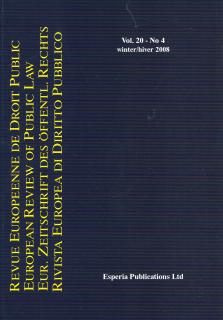
Constitutional Law / Droit constitutionnel
2007
Poland / Pologne
Université Jagellonne
The Prime Minister and leader of the conservative party Law and Justice, Mr. Jarosław Kaczyński, has tried to urge his political allies to exit the government coalition and to provoke early elections without having to assume the responsibility of having opened a government crisis. In the end, the Sejm has adopted a resolution which shortens the duration of the parliamentary term. The elections brought about a political change in power with the accession to power of the liberals of the Civic Platform in alliance with the Polish Peasant Party. The spectacular political events have contributed to restrain the reforming activity of the legislator. Four texts, however, deserve a more particular attention of the constitutionalists. The Parliament has adopted the Law of 14 February 2007, amending the Lustration Law of 2006, the Law of 7 September 2007 on the Polish Card, the Law of 26 March 2007, amending the Law on the National Judicial Council and some other laws, and the Law of 26 April 2007 on the crisis management. The Senate has amended its Rules of Procedure in order to ensure a most efficient execution of the Polish Constitutional Court’s decisions. The legislative commission of the Senate has to present the necessary draft laws in order to introduce the amendments made necessary by the Constitutional Court’s case law. The year 2007 has not led to a turnaround of the case law neither to the introduction of new case law principles, with the Court limiting its activity to the completion and development of previous case law. The main parties have often brought their disputes before the Constitutional Court, which has been obliged to pronounce a certain number of rulings deciding on harsh political conflicts, disguised in constitutional terms.
Le premier ministre et leader du parti conservateur Droit et justice, M. Jarosław Kaczyński, a essayé de pousser ses alliés politiques à sortir de la coalition gouvernementale et de provoquer des élections anticipées sans avoir à assumer la responsabilité d’avoir ouvert une crise gouvernementale. Finalement, la Diète a adopté une résolution abrégeant la durée de la législature. Les élections ont apporté l’alternance politique avec l’arrivée au pouvoir des libéraux de la Plateforme civique en alliance avec le Parti paysan polonais. Les événements politiques spectaculaires ont contribué à freiner l’activité réformatrice du législateur. Quatre textes méritent cependant une attention plus particulière des constitutionnalistes. Le parlement a adopté la loi du 14 février 2007 modifiant la loi de lustration de 2006, la loi en date du 7 septembre 2007 sur la Carte du Polonais, la loi en date du 26 mars 2007 modifiant la loi sur le Conseil national de la magistrature et certaines autres lois, et la loi en date du 26 avril 2007 sur la gestion des crises. Le Sénat a modifié son règlement pour assurer une exécution plus efficace des décisions de la Cour constitutionnelle polonaise. La commission législative du Sénat doit présenter les projets de lois nécessaires pour introduire des modifications rendues nécessaires par la jurisprudence de la Cour constitutionnelle. L’année 2007 n’a pas apporté de revirements dans la jurisprudence ni d’introduction de nouveaux principes jurisprudentiels, la Cour se bornant à compléter et à développer la jurisprudence antérieure. Les principaux partis ont porté plusieurs fois leurs conflits devant la Cour constitutionnelle. Celle-ci a été obligé de rendre un certain nombre d’arrêts tranchant des conflits politiques virulents, déguisés en termes constitutionnels.





















